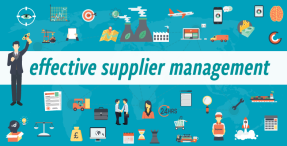People in Glass Houses.....6 Ways You Can Help Your Suppliers Perform Better
In this article , supplier management expert, Neil Jones, suggests that we should look at our own behaviours rather than blaming performance problems on our suppliers.
In this article he offers six tips to address the issue:
Clarity is Key
Be clear what ‘success’ looks like. Often companies award contracts and engage suppliers without a clear, unambiguous, simple statement of what they are trying to achieve.
Clearly, KPIs (Key Performance Indicators) and SLAs (Service Level Agreements) are necessary to manage supplier performance. Nevertheless, it is sometimes easy to lose sight of the bigger picture and focus on the finer details. Look at your own KPIs and then (honestly) answer the following questions.
- Do they measure ‘quality’ as well as quantity (times, numbers, volume etc.)
- Do your KPIs /SLAs encourage continuous improvement by the supplier – or merely compliance?
- ‘Key’ is the most important part of KPIs. Are you trying to measure everything, or focussing on the things matter?
- Are you measuring the right things? Can you state in one or 2 sentences what the contract/project hopes to achieve?
- Are you aware of potential ‘scope creep’ and are guarding against it?
Get The Basics Right
Make sure you get the administration and contract control mechanisms right.
Whilst not the most
glamorous aspect of effective supplier management, it is necessary to demonstrate the basis on which certain decisions were taken.
A written agreement / contract will minimise risks to both parties.
Likewise,an audit trail and control mechanisms need to be clear and understood by both parties.
Associated documentation, such as changes to requirements, minutes of meetings with suppliers etc. should also be maintained and easily accessible.
In the public sector or in regulated industries you will need to respond to any challenges or investigations in the process of contract award and management.
It is important to read the contract all the way through a couple of times. Whilst an in-depth legal knowledge is not necessarily important for effective supplier management, some understanding of key terms and typical clauses is always useful.
Consider who should get access to the contract itself. Consider setting the appropriate user permissions - or providing a summary of key aspects.
Some people may need full access; others could have read-only access. Managers will come up with all sorts of reasons why they should have access to the contract, and there may be no apparent harm in granting it. However, it is wise to limit access to those who need it.
Build Relationships with Suppliers
Focus on the ‘relationship’ with your suppliers first. The written contract should come second. Written contracts are inevitably ambiguous; if they weren’t why are contract law specialists so valued?
The contract exists to help you manage your relationship with your supplier. Goods & services are delivered by people, not by pieces of paper! Disputes, changes to requirements and continuous improvement are all much easier to achieve if you work with your supplier. Do you?
- meet regularly with your supplier to share information and to review performance?
- give them feedback on successes, not just areas for improvement?
- recognise your own and your organisation's shortcomings?
- If there is a problem do you reach out to your supplier?…. or reach into your drawer for the contract?
Don’t forget, it’s not just relationships with your suppliers that need attention. Senior managers, key stakeholders and end-users all need to be brought on board, ideally at an early stage to ensure that you have the necessary internal support.
Use a Flexible Leadership Style
Effective supplier management requires an appropriate (but flexible) leadership style.
Sometimes suppliers will need clear direction. This is particularly important at the start of the relationship if they have not worked with your organisation previously.
On other occasions, a much ‘lighter touch’ is needed as the supplier becomes more familiar with your requirements or when their motivation and skills are at an optimum level.
Sometimes the best style involves letting your supplier get on with things themselves, but be available for support if needed.
Fulfil Your Obligations
Fulfilling your obligations might sound obvious but paying your suppliers on time is crucial. Not only will late payment impact on your suppliers’ (particularly SMEs) cash flow, but it will have a knock-on effect on your relationship with them.
Other obligations on you include the need to avoid too many variations or changes to requirements, as well as those issues of communication etc. referred to above.
"If there is a problem do you reach out to your supplier?…. or reach in to your drawer for the contract?"
__________
Clearly, your supplier’s obligations to you primarily revolve around doing the work on time, to the appropriate quality (remember my earlier comments about 'knowing what success looks like') and to the agreed costs – as well as submitting their invoices on time!
Plan for success
Many problems which emerge during the delivery of goods or services by suppliers could have been avoided if a bit more thought had been put in before awarding the contract. Here are some examples:
1. Think about the length of your contract.
- Is a long-term partnership in both your interests?
- Would a shorter length term allow you to take advantage of developments in the marketplace?
- Do you really need a preferred supplier or would a ‘framework agreement’ offer more flexibility?
2. If you are considering changing supplier do you really understand the costs of changing? Or are you simply focussing on the immediate price reductions offered by a rival supplier?
3. Plan early for the end of the contract or project. The time to agree on the transfer of assets, possible transfer of staff, handover to a new supplier (or your own in-house team) is not when the contract is coming to an end.
To find out how Trussler Jones can help you develop effective supplier management strategies, please click below




